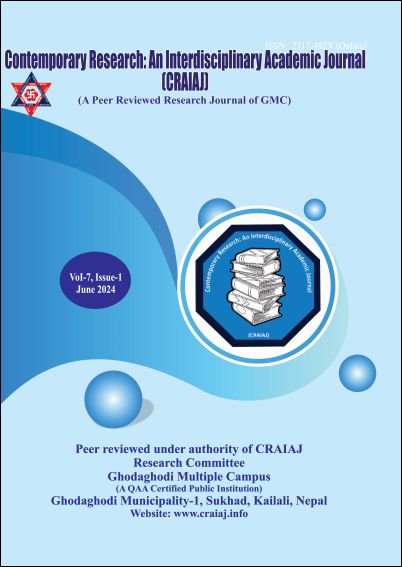A Discursive Concern on Pollution in Kathmandu Valley and Its Consequences
DOI:
https://doi.org/10.3126/craiaj.v7i1.67261Keywords:
Cause and effect, Discursive, Kathmandu, Overpopulation, PollutionAbstract
I find this dialogue meaningful here.
A gentleman: Hello sir, what are the three remarkable things you find in Nepal?
Tourist: Oh! I find that every man is a doctor; every man is a politician; and Kathmandu is a big toilet. (Source: Personal talk)
“Kathmandu is a big toilet”. What a joke! What a satire! Is Kathmandu so? Interesting! This paper explores the discursive concern about pollution in Kathmandu, the study area, and its consequences. The previous mayors of Kathmandu Metropolitan City (KMC) solved this problem partially. The city dwellers could not have breathed fresh air for about two decades despite several attempts by environmentalists and awareness articles written by national and international writers. The findings of the study show that Kathmandu is one of the dirtiest cities in the world and there is a possibility of lung cancer, respiratory problems, and many more. These adverse impacts of pollution are beyond prediction. This metropolitan city now has a new young energetic Mayor, Balendra Shah. The Kathmanduites have woven a big dream over him. I think he will come up with good new plans to address the discursive concern on the pollution problem. There are limited scholarly research papers published on this issue. The study sheds light on, “When will the day of crystal clean Kathmandu come?” and attempts to make the KMC people commit to strictly monitoring waste management. Pollution means the natural environment deterioration: air pollution, water pollution, land pollution, light pollution and noise pollution. This paper focuses on the strict implementation of strict rules to curb the pollution crisis. This provision mitigates the pollution problem so that people breathe fresh air and enhance the environmental literature. The mixed methods of cause and effect, document analysis and qualitative research were used in the study.
Downloads
Downloads
Published
How to Cite
Issue
Section
License
Copyright (c) 2024 Ghodaghodi Multiple Campus, CRAIAJ

This work is licensed under a Creative Commons Attribution-NonCommercial-NoDerivatives 4.0 International License.
© Ghodaghodi Multiple Campus, Research Committee, RMC

This work is licensed under a Creative Commons Attribution-NonCommercial-NoDerivatives 4.0 International License. This license enables reusers to copy and distribute the material in any medium or format in unadapted form only, for noncommercial purposes only, and only so long as attribution is given to the creator.




